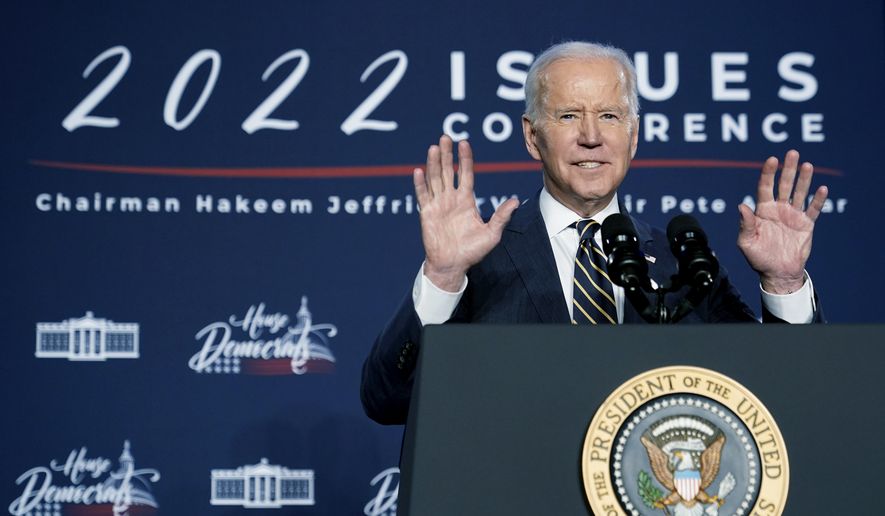President Biden’s $1.5 trillion government funding bill funnels millions of dollars in pork to vulnerable Democrats in November’s midterm elections while benefiting Republicans who helped secure its passage.
Mr. Biden’s 2,741-page budget bill, which passed with bipartisan support last week, was the first in more than a decade to include earmarks. The discretionary spending measures were long banned under Republican control of Congress but returned last year under the Democrats’ unified control of the House and the Senate.
Although Republicans also benefit from the budget’s allotments, some of the biggest winners from the inclusion of $8 billion in earmarks are Democrats facing tough reelection challenges. Sen. Raphael G. Warnock, for instance, inserted earmarks worth roughly $95 million to fund pet projects in his home state of Georgia.
“I’ve talked to Georgians and traveled across the state to make sure this funding bill reflects the projects and priorities that are important to our families, businesses and communities,” said Mr. Warnock, who won his seat by 93,000 votes in a special election.
The money is primarily for infrastructure projects and grants to local governments and nonprofits, including $1 million for a Georgia county to index land records for historical preservation.
Political strategists say the return of earmarks presents a boon for vulnerable Democrats, who can now tout their ability to bring money home for constituents. The political value of earmarks is considered especially significant for lawmakers without seniority or leadership positions.
“Earmarks could literally alter the outcome of the 2022 election because freshmen or junior members who otherwise cannot pass legislation or add budget riders have the chance to secure multiple, multimillion-dollar projects,” said Colin Strother, a Texas-based Democratic consultant.
Nearly all Democrats seeking reelection this year secured earmarks for their districts.
Sen. Catherine Cortez Masto, a Nevada Democrat who won her seat in 2016 by a slim 27,000 votes, inserted a total of 53 earmarks. That included $500,000 for horse management at the Nevada Department of Agriculture and $4.8 million for a fleet of zero-emission buses in the Las Vegas region.
“I’ll keep advocating in Congress for funding … sustainable and accessible solutions that will improve Nevadans’ quality of life and boost our economy,” she said.
Nearly every House Democrat considered to be in danger of losing reelection secured millions of dollars in earmarks. The overall sum for House Democrats was smaller because they were limited to 10 earmarks each.
Rep. Cynthia Axne, an Iowa Democrat who is a top target of Republicans this cycle, pulled in more than $10 million for her district. She won reelection in 2020 by fewer than 7,000 votes.
“This money is going to be used to rebuild bridges, to expand child care centers and affordable housing projects and so much more,” Mrs. Axne said.
Democrats were the biggest beneficiaries of earmarks largely because their party controls both chambers of Congress and the White House. Still, Republicans also benefited. Several Republican lawmakers who crossed party lines to pass Mr. Biden’s budget secured earmarks.
Sen. Richard C. Shelby of Alabama, the top Republican on the Senate Appropriations Committee, secured about $650 million in earmarks. Three of his earmarks totaled roughly $300 million, including $60 million to expand research facilities at the University of South Alabama’s college of medicine.
“This bill importantly invests in a host of domestic priorities, including medical research, agriculture, local infrastructure and rural communities,” said Mr. Shelby, who is not seeking reelection this year. “These resources will bolster needed advancements, promote economic development and encourage job creation.”
Not every Republican who backed the budget inserted earmarks. Senate Minority Leader Mitch McConnell voted for the budget but did not request money for pet projects in his home state of Kentucky.
The inclusion of earmarks nearly derailed the budget’s passage. A cadre of Republican lawmakers attempted to stall the bill long enough to miss a Friday deadline and trigger a government shutdown.
The Republicans promised to use an arsenal of legislative procedures to block any attempt by Senate Majority Leader Charles E. Schumer, New York Democrat, to expedite the bill’s passage. Mr. Schumer eventually relented.
In exchange for allowing speedy consideration of the bill, Republicans received votes on a series of amendments, including one by Sen. Mike Braun that would have gutted earmarks from the final bill.
Mr. Braun, Indiana Republican and a member of the Senate Appropriations Committee, said he offered the amendment because of the profligate spending via earmarks and the overall shadowy nature in which the budget bill was crafted.
“There was no discussion among any of the other appropriators until we saw the bill get dropped in our lap a day or two before the vote,” the senator said. “So it’s in the context of that kind of dysfunction.”
Mr. Braun’s amendment, which needed a simple majority of 51 votes to pass the evenly split Senate, was defeated 54-35.
“I’m guessing that I’m the only appropriator that voted to strike earmarks, and I’m guessing all the other appropriators all had earmarks in there,” Mr. Braun said.
• Haris Alic can be reached at halic@washingtontimes.com.




Please read our comment policy before commenting.